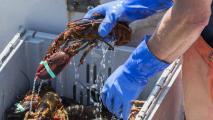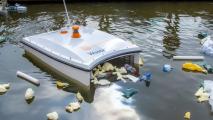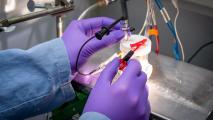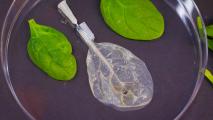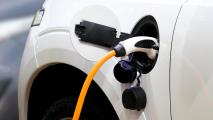
Energy
Energy powers civilization. Developing technologies that can deliver abundant, sustainable energy is the challenge of our time and the promise of our future. Failure is not an option.
More
This laundry detergent is made from recycled carbon
Consumer goods company Unilever is now selling a laundry detergent that’s made using recycled carbon instead of traditional fossil fuels.
Startup aims to put lab-grown lobster on the menu
Wisconsin startup Cultured Decadence is developing lab-grown lobster meat in the hopes of meeting a demand currently threatened by climate change.
Look at how much the planet has changed in four decades with Google Earth Timelapse
The new Google Earth Timelapse feature lets us scan the globe and look back from the present day to 1984 to see how human action and natural forces have changed the planet since the 1980s.
Rare wild coffee species brews hope for coffee’s future
A rediscovered coffee plant that can flourish in warmer climates, according to scientists, may be the future of coffee production, helping future-proof the morning ritual against climate change.
This new crystal, produced with gunpowder, is stronger than diamond
Researchers have developed hexagonal diamonds — the mineral lonsdaleite — large enough to study in a lab and test their stiffness and hardness.
Solar canals in CA could save 63 billion gallons of water a year
Researchers looked into what it would take to cover California’s canals with solar panels and found that the benefits of solar canals outweigh the costs.
Digital price tags auto-discount groceries to avoid food waste
A startup called Wasteless uses dynamic pricing and electronic shelf labels to help minimize food waste at grocery stores.
Can seaweed save the planet?
A Maine startup is growing vast quantities of seaweed and then burying them at the bottom of the ocean to sequester carbon for carbon offsets.
How tech helped beat back locust swarms in East Africa
Billions of locusts descended on East Africa in 2020, where new technology helped stop their spread.
Autonomous trash-eating boats clean up water pollution
New designs in autonomous boats, and a trash wheel that intercepts drifting trash, act as on-the-water trash-eating machines.
The world's whitest paint can cool your house — and the Earth
The whitest white paint reflects up to 98.1% of sunlight, which could make it useful for cooling homes in place of energy-hogging air conditioners.
Human hair makes perovskite solar cells more efficient
Perovskite solar cells featuring a layer of carbon nanodots made from human hair were more efficient and stable than those without the dots.
Artificial photosynthesis machine improves itself over time
An artificial photosynthesis device that gets more efficient with time could finally allow us to harness solar energy for uses beyond electricity.
Spinach skeleton becomes base for lab-grown meat
After spinach leaves were stripped of their plant cells, the skeletons were used as a scaffold for lab-grown meat.
What is the future of wave energy?
The Federal Energy Regulatory Commission has approved the first commercial-scale, utility grid-connected test site for wave energy.
Are ancient city grids still the best way to build?
Although their roots date back thousands of years, city grids are starting to inspire modern urban planners. Is the grid still the best way to build?
An explosive lake becomes a source of power
Lake Kivu in central Africa is on the verge of exploding. To prevent disaster, Rwanda is using the lake as a source of energy.
Can weather modification save us from megadroughts?
Scientists predict that the western U.S. is entering the most severe “megadrought” on record. One weather modification solution is cloud seeding.
A battery revolution could make electric cars a reality for everyone
We’ll need a new type of battery to make electric cars cheaper and convenient.
Solar panels in space could beam continuous energy back to earth
Capturing the sun’s boundless light in space could revolutionize how we distribute energy around the world.
Get inspired with the most innovative stories shaping the world around us.




